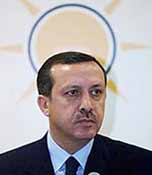Turkey May Decline to Send Troops
Investigators suspect that last week’s bombing of the Turkish embassy here was carried out by the Kurdish Workers Party (PKK), a Kurdish group that has fought a long guerrilla war against Turkey, according to a senior Iraqi official.

USA and Iraqi officials had thought initially that Tuesday’s suicide bombing was the work of Saddam Hussein supporters or fighters linked to Osama bin Laden’s al-Qaida network who have slipped into Iraq in recent months. But investigators have developed evidence of the PKK’s involvement in the bombing, which injured 10 people, said a senior official at the Iraqi Interior Ministry. “The investigation is not finished, but there are signs that the PKK was behind this bombing,” said the official, who asked not to be identified.
If blame is ultimately placed on the PKK, it would create another complicating factor for the USA-led occupation of Iraq. The PKK, which fought a 15-year war against the Turkish army that earned both sides reputations for brutality, has been based in the rugged mountains of northern Iraq since it was crushed by Turkish forces in the 1990s. The group has about 5,000 fighters, and the United States recently demanded that it disarm and stop carrying out military operations from Iraqi territory.
The attack on the heavily fortified Turkish embassy in Baghdad came a week after Turkey’s parliament voted to send troops to Iraq. Most Iraqis, including the USA-appointed Governing Council, are opposed to Turkey deploying 10,000 troops to bolster USA forces in Iraq. Iraqis are worried that Turkey wants to dominate oil-rich northern Iraq and that the presence of Turkish troops will cause friction with Iraq’s Kurdish minority.
PKK leader Osman Ocalan, who took command of the group after his older brother Abdullah was captured by Turkey in 1999, has said he is willing to disarm his group if USA officials agree to allow his fighters to remain in their mountain bases. “If the conditions are good enough, disarmament will not be a problem.”
The suicide bombing had signalled that Iraqi insurgents attacking USA troops also would target Turkish forces if they are deployed here. But the situation would become even more complicated if the PKK and other Kurdish groups attack Turkish troops in Iraq. “It would be a very troubling development if the PKK was targeting Turkish interests in Iraq,” said the Interior Ministry official.
Despite Iraqi complaints, the United States strongly supports the Turkish deployment. Washington hopes Ankara’s decision will lead to an influx of other international troops to help control Iraq and perhaps lessen USA casualties. British, Spanish and Polish troops are now deployed in Iraq. The Turks would be the first contingent from a Muslim country and from one of Iraq’s neighbours.
“All the Iraqi political parties agree on one thing: We don’t want a Turkish presence in Iraq,” said Ali Abdel-Amir, a spokesman for Iyad Allawi, who is chairing the Governing Council this month. “The Turkish presence would be a destabilizing force.”
Meanwhile, Turkish Prime Minister Recep Tayyip Erdogan hinted for the first time that his country would abandon plans to dispatch troops to Iraq if they are not welcomed there. His comments also followed media reports that Washington was hesitating on whether to insist on a Turkish military involvement after the strong objection in Baghdad.
“If we are wanted we will go, if we are not wanted we will not. We have not made a ‘must’ decision,” Anatolia news agency quoted Erdogan as saying. “Iraq is our neighbour and will continue to be so in the future. We will not undertake anything that may lead to problems. The demands of the Iraqi people are very important for us,” Erdogan said.
Before making its final decision Turkey will wait to see developments following the adoption Thursday of a UN Security Council resolution which authorizes the establishment of an international security force in Iraq, the Turkish leader said.
Drawn from al-Bawaba & Newsday